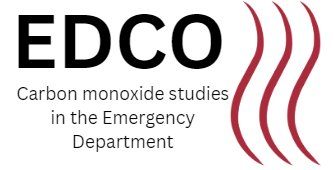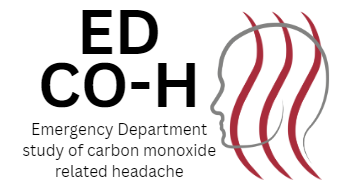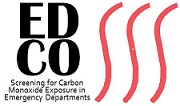The EDCO studies: research into low level carbon monoxide exposure in emergency department patients
<< Back to ED Clinical Research Unit page

Chief Investigator: Heather Jarman
Study coordinator: Kathryn Willis
Carbon monoxide is a colourless, tasteless, odourless gas produced by incomplete fuel combustion. The signs and symptoms of exposure are non-specific and therefore it is difficult to diagnose; if the diagnosis is missed it may lead to long-term health problems. Unfortunately, no-one knows exactly how big a problem this may be. The EDCO studies aim to provide information on issues relating to low-level, unintentional, non-fire related carbon monoxide exposure in emergency department patients.
Details of each of the studies are below.
The EDCO-H study: screening for low-level carbon monoxide exposure in patients attending the Emergency Department with headache

The EDCO-H study aims to find out the number of patients presenting to the ED who have a headache caused by exposure to low-level carbon monoxide (CO). Clinicians in the ED often do not consider CO as a cause of headache which puts patients at risk of ongoing CO exposure when discharged home. We will see if it is feasible o identify carbon monoxide (CO) exposure in Emergency Department (ED) patients presenting with headache using a combination of CO testing, a screening questionnaire and environmental CO monitoring.
______________________________________________________________
The EDCO-D study: identifying delays in diagnosis of carbon monoxide in the Emergency Department

The EDCO-D study is aiming to find out the number of patients who have been exposed to CO presenting to a large number of EDs across Europe, and to establish those with delays in diagnosis and those with a missed diagnosis. The study is taking place in around 30 EDs across the UK and Europe. It will retrospectively review patient records who presented to ED with both increased carbon monoxide levels and symptoms consistent with CO poisoning.
______________________________________________________________
The EDCO-M study: carbon monoxide alarm ownership in emergency department patients
ISRCTN registration: 12562718

The EDCO-M study is a multi-centre cross-sectional survey, funded by the CO Research Trust. Having a carbon monoxide alarm installed in homes can help with early detection of carbon monoxide and reduce the risk of exposure. We know that not everyone has a carbon monoxide alarm in their homes and we are trying to find out if there are differences in those who have alarms compared to those that do not so we can provide tailored information on carbon monoxide alarm use to those that need it.
This study is now closed. See below for results and publications.
Publications
______________________________________________________________
The EDCO study: screening for carbon monoxide in the Emergency Department
ISRCTN registration: 16329899
The EDCO study is a enhanced surveillance study, funded by the CO Research Trust (previously the Gas Safety Trust), working in collaboration with the University of Surrey and Public Health England.
This study is now closed. See below for results and publications.
The EDCO study aims to:
- Find out how commonly are people presenting to emergency departments are actually exposed to carbon monoxide
- Evaluate a screening tool for identification of patients with symptoms of carbon monoxide exposure
- See if there is a seasonal variation in the levels of carbon monoxide exposure
- Try and identify new blood markers of carbon monoxide exposure that are more reliable than the current
Publications
Jarman H, Atkinson RW, Baramova D, Gant TW, Marczylo T, Myers I, Price S, Quinn T. Screening patients for unintentional carbon monoxide exposure in the Emergency Department: a cross-sectional multi-centre study. J Public Health (Oxf). 2023 Jan 31:fdad007. doi: 10.1093/pubmed/fdad007. Epub ahead of print. OPEN ACCESS
Associated publications
Cappelletto M, Jarman H (2021) Screening and management of unintentional low-level carbon monoxide exposure in the emergency department. Emergency Nurse. doi: 10.7748/en.2021.e2077



